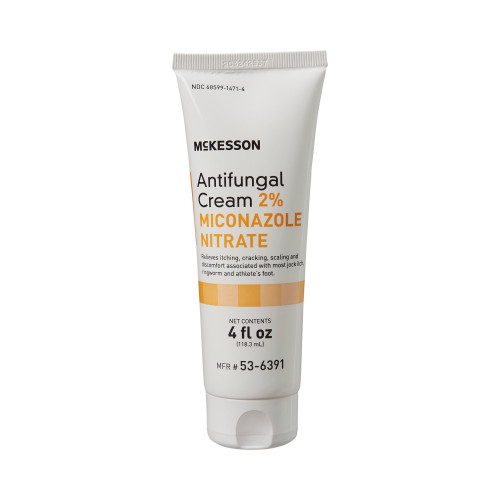-

Thera
Thera 2% Miconazole Nitrate Antifungal Powder, 3 oz Shaker Bottle
Effectively treat superficial skin infections caused by yeast by applying this Thera 2% Strength Antifungal Powder. The powder works to help relieve your symptoms of itching, scaling, cracking, burning, redness, soreness, chafing and irritation. The...
As low as $10.55 -

Dermarite
DermaFungal Antifungal Cream, 2% Miconazole Nitrate, 3.75 oz
DermaFungal is an antifungal cream with 2% miconazole nitrate. Miconazole is an azole antifungal that works by preventing the growth of fungus.Use DermaFungal to treat skin infections such as athlete's foot, jock itch, ringworm, and other fungal skin...
As low as $7.16 -

McKesson
McKesson Antifungal Cream - Itch Relief Lotion, 2% Miconazole Nitrate
Relieves itchy, cracking, scaling and discomfort associated with most jock itch, ringworm and athlete's foot.Treat your itching, cracking, scaling, burning, redness, soreness, chafing and irritation by applying this McKesson 2% Strength Antifungal Cream...
As low as $10.20
Antifungals

Antifungals
Antifungals treat fungal infections that usually affect your skin, hair, or nails. Over-the- counter antifungal medications come in several forms:
What Conditions Do Antifungals Treat?
Antifungals can treat several common fungal infections. These include:
When to See a Doctor
Most minor fungal infections are treatable at home with the use of over-the-counter antifungals. However, you may need to see a doctor if:
Which Antifungal Product is Right for You?
When choosing the right over-the-counter antifungal medication, things can be a little confusing. There are a variety of brands and options. For example:
Choosing the Right Over-the-Counter Antifungal
Making the right antifungal choice for you and your body is a simple matter of asking yourself a few questions:
Antifungals treat fungal infections that usually affect your skin, hair, or nails. Over-the- counter antifungal medications come in several forms:
- Antifungal powder defends against moisture build-up in skin folds.
- Antifungal cream can help soothe itching, burning, scaling, cracking, redness, soreness, irritation, and scratching
- Antifungal spray
- Gels and ointments
What Conditions Do Antifungals Treat?
Antifungals can treat several common fungal infections. These include:
- Vaginal thrush (commonly known as a yeast infection)
- Athletes’ foot
- Ringworm
- Jock itch
- Tinea versicolor (fungal/yeast skin infection that causes small, oval, discolored skin patches)
- Poison ivy
- Poison oak
- Rashes
- Several types of nail fungus
When to See a Doctor
Most minor fungal infections are treatable at home with the use of over-the-counter antifungals. However, you may need to see a doctor if:
- The condition keeps coming back or gets worse.
- You have diabetes and suspect you have an athletes’ foot or another foot fungus, as this can result in severe infections and complications.
- If you have a weakened immune system.
- If you notice patches of hair loss or large patches of dry, itchy skin.
Which Antifungal Product is Right for You?
When choosing the right over-the-counter antifungal medication, things can be a little confusing. There are a variety of brands and options. For example:
- Nitrate antifungal creams can be found in different brands and strengths. The active ingredient, miconazole nitrate, treats conditions like athletes' foot and jock itch by preventing fungus growth.
- Antifungal powder is another option for conditions like jock itch and athletes’ foot. Powder can easily be applied to feet by adding into socks before donning.
- Vaginal itching and yeast infections can be relieved by creams or through a pessary, often called a vaginal suppository.
- Itch relief products include creams, calamine lotion, hydrocortisone cream, and antihistamine cream, which treat the symptoms of fungal infection. Itch relief products can help provide relief from poison ivy, poison oak, insect bites, allergies, and rashes.
Choosing the Right Over-the-Counter Antifungal
Making the right antifungal choice for you and your body is a simple matter of asking yourself a few questions:
- Brand: You may have a brand preference or trust one brand over another.
- Value: Cost is certainly a factor, but some higher quality items work better and provide a better value overall.
- Allergies and reactions: All antifungal products have ingredients that can cause allergic reactions if you are sensitive to them. If you are allergic to common ingredients, you may have to explore products with different formulas. Always consult with a healthcare provider before starting an antifungal treatment if you have pre-existing allergies.
